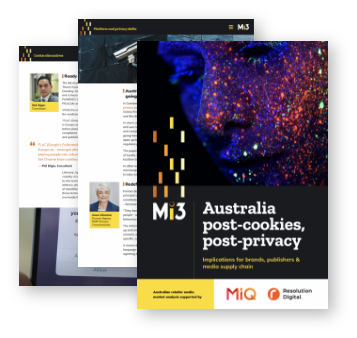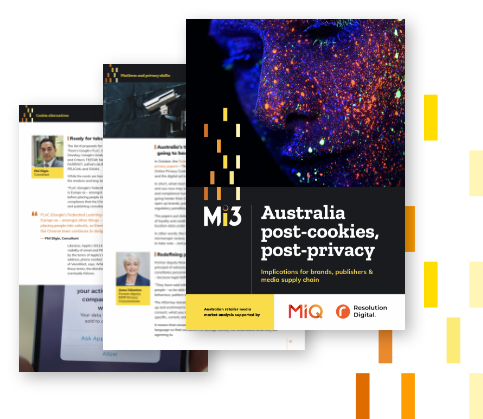Menulog CMO warns on publisher walled garden race: Can Nine, Seven, Ten, News collaborate to take on big tech?
An Mi3 editorial series brought to you by
Resolution Digital and MiQ


As Australia's publishers race to build walled gardens, Menulog CMO Simon Cheng warns brands are loathe to strike "individual deals with everyone".
Brands fear buying ad campaigns across a patchwork of walled gardens will become much harder when cookies are culled. But media owners are busy building their own ecosystems and first party identity graphs – with little love lost between fierce rivals. Unless Australia's big publishers can collaborate and interoperate, agencies and consultants think Facebook and Google will take an even larger share of digital marketing budgets.
Mi3 Special Report: Australia Post-Cookies, Post-Privacy

Interviews with 35-plus marketers, publishers and media supply chain. Insights, intelligence, case studies, survival strategies.
What you need to know:
- Australia’s biggest publishers are effectively building walled gardens underpinned by logged in audiences that advertisers can target using their own first party data.
- But brands worry that a patchwork of walled gardens will make buying ads much more involved, with scale harder to achieve.
- “The challenge is how to get to a solution that offers us scale – because I don’t think we want to be doing individual deals with everyone.” – Menulog CMO, Simon Cheng
- Cheng thinks publishers may have to collaborate, tech providers and agencies agree
- 10 ViacomCBS already looking to strike partnerships.
- The alternative is more money for Facebook Google.
- Get the full picture in Mi3's 67 page special report: Australia post-privacy, post-cookies.
When you get to a cookieless world, the only way brands are going to be able to do effective targeting is by using publishers’ first party data.
New walled order
Marketers fear publishers racing to build walled gardens and their own proprietary audience ID systems risks further fragmentation that makes ad buys at scale much harder as cookies are culled.
Menulog CMO Simon Cheng backs Australia’s big publishers to deliver data-driven audience buys and insights in a post-cookie world, but worries scale may be far harder to achieve.
"The way I describe it to people is simple: when you get to a cookieless world, the only way brands are going to be able to do effective targeting is by using publishers’ first party data," Cheng told Mi3.
“Cookie-based marketing has a lot of flaws. It is nowhere near as reliable as a people-based system. It’s just that people-based targeting requires a lot more resource to get it right. All the publishers are moving in that direction, each at different stages. The challenge is how to get to a solution that offers us scale – because I don’t think we want to be doing individual deals with everyone.”
No matter how many ID resolution companies there are, unless we’re all using the same one, it doesn’t really work. And we’re never going to be on the same one as Google, or the same one as Facebook, so that problem compounds.
Stop, collaborate and listen
Australia’s big publishers have tried to collaborate before – but failed due to individual commercial interests clouding the bigger picture. Could the threat of losing even more dollars to the likes of Facebook and Google create the necessary impetus?
“I think it's just too early to judge them on it,” said Cheng. “They're all signalling good intent. And to be honest they are probably going to be forced to get there anyway.”
But 10 ViacomCBS Head of Data and Digital Audience, Josh Slighting, thinks publishers may be too focused on “self preservation” and their own individual strategies amid an identity arms race.
He thinks a lack of unity will undermine attempts by the media supply chain to create cookie alternatives – or alt IDs – that work across publishers.
“No matter how many ID resolution companies there are, unless we’re all using the same one, it doesn’t really work. And we’re never going to be on the same one as Google, or the same one as Facebook, so that problem compounds,” said Slighting. “Right now, everyone’s panicking: ‘I don’t have one and Google’s changing so I better just sign up for something’. But if not all of us are aligned on the same thing, it doesn’t work.”
While Ten is backed by a global media conglomerate, it does not have the broader publishing assets its biggest rivals can offer advertisers.
Slighting indicated the network is open to striking partnerships, potentially with independent news providers, in order to compete on a more even footing. He thinks publisher collaboration would go some way to addressing advertiser concerns about the hassle of dealing with multiple walled gardens while delivering growth opportunities to all parties.
Slighting points to Paramount Plus’ deal with Optus (for the telco’s bundled subscription service) as sign of more dealmaking to come.
“Are you focused on self-preservation, or are you focused on the longer-term future?” said Slighting.
“As an industry, we have profited from some pretty shady practices. Now we have to take our medicine and there will be a correction. So you can try to find short-term fixes because it’s good for shareholders, or you can take the hit. I’d rather take the hit and invest in the long-term – and I do think that good partnerships will pay dividends.”
Publishers have got to build out [their ID strategies and interoperability] in a way where they give themselves that option to collaborate down the track, once they get to the point where they understand that the risks … don’t really matter.
Reap what you sow
MiQ’s Apac Operations Officer Damien Healy agrees buying media at scale across a greater number of walled gardens will be harder, but said advertisers will get out what they put in. Otherwise, they risk becoming “ostrich buyers … that put their head in the sand and hope that other companies solve it for them … People are going to have to lean in a bit more.”
MiQ ANZ CEO Jason Scott thinks publishers may – eventually – overcome fierce rivalries. He pointed to VOZ, the total TV metric jointly developed by Australia’s TV networks, as an example of collectivism for the greater good.
“I hope we see a world where folks choose to collaborate. But it will take some time, because Australia has a history of not doing that,” said Scott.
Either way, he said, publishers “have got to build out [their ID strategies and interoperability] in a way where they give themselves that option to collaborate down the track, once they get to the point where they understand that the risks … don’t really matter.”
If we want to market at scale using addressable audiences, it’s playing in the hands of the walled gardens, and it’s really difficult to see a vision outside of that.
Another brick in the wall
The alternative is that Australia’s big publishers risk losing more money to Google and Facebook, which now trouser more than 80 per cent of Australia’s digital ad dollars.
Philip Pollock, COO at Resolution Digital, thinks that duopoly outcome is most likely in the medium term, given marketer desire for scale, the challenges individual publishers currently face with audience match rates (the percentage of a publishers’ audiences that match an advertiser’s first party data and are logged-in when the campaign is running), as well as existing challenges in tracking and de-duplicating buys across channel silos.
“The idea of more walled gardens or more siloed approaches creates additional challenges,” said Pollock.
He thinks that may lead brands and buyers to plump for single platforms that can deliver the biggest hit in one go, seeking ease and convenience within Big Tech’s established walled gardens
Where brands seek hyper-targeting at scale, “we will be working mostly within closed environments … anything outside of that, it’s going to be almost impossible to have that notion of ‘one-to-one addressability’,” said Pollock.
“It doesn’t matter if we’re using some type of identity solution and identity graph. Realistically, we’re seeing this play out: If we want to market at scale using addressable audiences, it’s playing in the hands of the walled gardens, and it’s really difficult to see a vision outside of that," he added.
“I’m not saying brands are necessarily comfortable with moving into that way of working, but the majority of clients that we see feel that to achieve business goals, it is really the only solution that we can use at the moment.”
This article is based on marketer, publisher and agency research undertaken for Mi3's latest special report: Australia post-privacy, post-cookies, a 67-page paper based on 35 expert interviews. Download the report here.
Mi3 Special Report: Australia Post-Cookies, Post-Privacy
- How brands including ANZ, CommBank, Adore Beauty, Little Birdie, Menulog and Westpac are racing for new privacy-compliant ways to market to customers as platform and regulatory changes bite.
- Report covers all of Australia‘s major publishers, their strategies.
- All major alternative IDs covered.
- Plus marketing consultancies, tech provider and agency insights.
- Independent Mi3 report, based on 35-plus interviews, supported by MiQ and Resolution Digital.
How brands including CommBank, Adore Beauty, Little Birdie, Menulog and more are racing for new privacy-compliant ways to market to customers as platform and regulatory changes bite.
Get ahead of the curve. DOWNLOAD THE REPORT HERE DOWNLOAD your 67-page report here.
